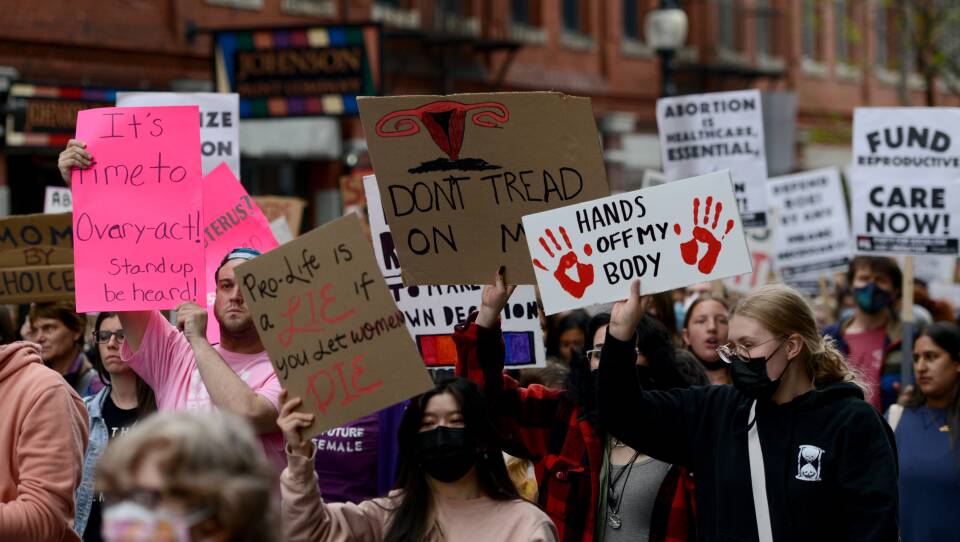Updated June 24 at 12:47 p.m.
The Supreme Court on June 24 overturned Roe v. Wade, the landmark 1973 case that had guaranteed the constitutional right to abortion. The 6-3 decision in Dobbs v. Jackson Women's Health Organization means that states will be able to make their own laws around abortion.
At least 13 states had already passed “trigger laws,” meaning abortion will be outlawed within 30 days, and 13 others are likely to heavily restrict access. The right to abortion is protected in Massachusetts.
Here’s what you need to know — and what it all means for Massachusetts.
What are the current laws in Massachusetts?
Abortion is legal in Massachusetts up to 24 weeks of pregnancy, and beyond 24 weeks in case of the mother’s health or fatal fetal anomaly. People can obtain an abortion from a physician, physician assistant, nurse practitioner or nurse midwife, and now through telehealth. Patients under the age of 16 are required to obtain parental consent, though a judge can excuse a young person from this rule.
Massachusetts has some of the widest access to abortion in the country, according to the Guttmacher Institute. Numerous other states have restrictions such as waiting periods, required counseling or ultrasounds, insurance restrictions, and regulations about the physical clinics and buildings where abortions can be performed — none of which apply in Massachusetts.
According to Guttmacher Institute, 13% of women in Massachusetts ages 15-44 live in a county without a clinic. That jumps to 38% for all women nationwide and in Mississippi it's 91%.
At the end of 2021, the FDA loosened restrictions on medication abortion through telehealth, allowing doctors to prescribe abortion pills in the mail to patients after a virtual consultation. As more awareness grows about the option, practioners say the service could be vital in reaching patients in areas of the country where abortion access is restricted. It's already having an impact in places like Martha's Vineyard and Cape Cod, where previously a person would have to travel off the island to access in-person abortion care.
More Local News
Why is this Supreme Court case different? Why is this happening now?
For nearly 50 years, the pro-life movement has been trying chip away at abortion rights, mostly through restrictive laws in Republican-controlled state legislatures, Amy Littlefield, the abortion access correspondent for The Nation, explained on Greater Boston December. Those efforts picked up after former President Donald Trump appointed several conservative Supreme Court justices.
This Mississippi case was different because it outlawed abortions after 15 weeks, while Roe v. Wade protected the right to abortion up until viability, which is around 24 weeks.
“This case marks the first time in literally 50 years that the court has agreed to hear a case on the constitutionality of pre-viability abortion bans,” Carol Rose, executive director of the ACLU of Massachusetts, said on Greater Boston.
Many doctors and practitioners were not surprised by the Supreme Court decision and its May leak, according to Dr. Marcus Gordon, who provides abortions at the Four Women Health Services in Attleboro and also travels to Charlotte, North Carolina to provide care. They've been preparing for this possible outcome, although it's more extreme than they anticipated.
“It’s disappointing but expected," he told GBH News in May. "Even folks in the field were hoping that there'd be some sort of something in between what we now have and what it looks like we're going to have after this is finalized in the summer."
Read more about the history of Roe v. Wade and legal abortion rights in the U.S.
What happens now? What does the Dobbs decision mean?
Abortion access now varies widely from state to state. There are 13 states with “trigger laws,” meaning they outlawed if Roe v. Wade fell. Experts say that at least 13 more states are likely to follow with their own laws.
"The Constitution does not prohibit the citizens of each State from regulating or prohibiting abortion. Roe and Casey arrogated that authority,” the justices wrote in their majority decision.
What does this decision mean for Massachusetts?
Abortion access is protected in Massachusetts.
In December 2020, the state legislature overrode a veto from Gov. Charlie Baker and passed the ROE Act in anticipation of challenges to Roe v. Wade. The act strengthened access by allowing abortions after 24 weeks in certain cases to protect the health of the patient or if there is a fetal anomaly. The act also lowered the age that a person can obtain an abortion without parental consent to 16, from 18.
How are political leaders and reproductive justice advocates in Massachusetts attempting to broaden access?
Reproductive justice groups in Massachusetts have been preparing for the fall of Roe, and the potential impact it could have in Massachusetts, even as abortion remains legal in the state. The Massachusetts ACLU, Planned Parenthood Advocacy Fund of Massachusetts and Reproductive Equity Now launched the Beyond ROE Coalition in May to address access barriers in the state, with proposals to: mandate insurance coverage for abortions, increase access to emergency contraception, widen access to medication abortion on public college campuses and provide more support to abortion funds.
Right after the Supreme Court released its decision, Gov. Charlie Baker announced an executive order to protect providers who perform abortions for out-of-state patients as well as people from other states who seek abortions in Massachusetts.
“This executive order will further preserve that right and protect reproductive health care providers who serve out of state residents. In light of the Supreme Court’s ruling overturning Roe v Wade, it is especially important to ensure that Massachusetts providers can continue to provide reproductive health care services without concern that the laws of other states may be used to interfere with those services or sanction them for providing services that are lawful in the Commonwealth," Baker said in a statement.
At the beginning of June, Planned Parenthood League of Massachusetts launched a new center focused on researching barriers to reproductive healthcare, and the impact they have on marginalized communities.
WATCH: The latest on abortion access in Massachusetts
@gbh The latest on #abortion access in #Massachusetts ✍️ #roevwade #boston ♬ News serious information news program - gooooodee_jay
What could be the longer-term effects of this decision?
Experts say that people in all parts of the U.S. could see increased wait times, as patients would have to travel to neighboring states to access abortion, says Littlefield.
She cited what happened in Texas, after the state enacted a law in September that effectively banned abortion after six weeks. Littlefield says many patients crossed state lines and filled up appointments at overworked clinics. “Think about that multiplied by [26]... where we could have patients facing that same mass migration.”
Nicole Huberfeld, a law professor at Boston University School of Law, said on GBH's Morning Edition in May, that without Roe, more people could travel to states like Massachusetts.
"What it's likely to mean is that Massachusetts will have more people crossing into the state to access healthcare, which is a phenomenon that already occurs because of our generous universal health care system. The Massachusetts law is slightly more generous than the New Hampshire law," she said.
Dr. Cheryl Hamlin, an obstetrician-gynecologist at Mount Auburn Hospital in Cambridge, traveled to Mississippi once a month to perform abortions that local doctors can’t or won’t do. She told Boston Public Radio in December that she had already seen an uptick in patients at the clinic. “We've seen a bunch of patients from Texas … [who say] ‘I drove eight hours to get here, you're telling me I have to come back another day?’"
Who will be most impacted by this decision?
Hamlin says that she has witnessed how abortion restrictions impact certain types of people. She says most of the abortions she performs are before 11 weeks, but the women who come in later, who would be impacted by this Mississippi law, are usually the most vulnerable. “Those are often the women that are the most disenfranchised,” she said. “They a lot of times are adolescents, actually.”
Many reproductive justice advocates are saying that in reality, abortion bans unequally impact lower-income women and especially women of color. According to the Guttmacher Institute, 75% of abortion patients are poor or low-income, while 28% are Black and 25% are Hispanic.
Gordon said that overturning Roe v. Wade will have the greatest impact on marginalized communities.
"The folks that are going to be most impacted are people without means," he said. "So people will have to travel out of state for abortions and some are not going to be able to afford that. And they will, of course, have abortions anyway, just in less safe conditions."
How have Mass. politicians reacted to the decision?
Massachusetts politicians quickly spoke out against the SCOTUS opinion and re-upped their support for abortion access.
Here's what some Mass. officials said:
Today, in response to the US Supreme Court ruling overturning Roe v Wade, I signed an executive order to protect access to reproductive health care services in the Commonwealth.
— Charlie Baker (@MassGovernor) June 24, 2022
Read the executive order: https://t.co/LaS7THmnOu pic.twitter.com/ZcDEqGpX1Z
We will never stop fighting to affirm what we know is true: abortion care is a fundamental human right.
— Ayanna Pressley (@AyannaPressley) June 24, 2022
The overturning of Roe v. Wade and Casey v. Planned Parenthood is an egregious and overtly political act that jeopardizes the health, safety, and freedom of millions of Americans. Abolish the filibuster, pass the Women's Health Protection Act, and expand the Court now.
— Ed Markey (@SenMarkey) June 24, 2022
My statement on the Supreme Court overturning #RoeVWade: pic.twitter.com/a3iEBTuctv
— Elizabeth Warren (@SenWarren) June 24, 2022
Today is a dark day in our history. For nearly 50 years, the constitutional right to abortion has saved lives. It is freedom, healing, and the chance to live your life on your own terms. That will never change, which is why we can never give up on realizing this freedom for all.
— Maura Healey (@maura_healey) June 24, 2022
An extremist majority on the Supreme Court just decided to undermine American's freedom by giving politicians say over private healthcare decisions that should be between a women and her doctor.
— Rep. Jim McGovern (@RepMcGovern) June 24, 2022
While this is a dark day in our nation’s history, it must be a catalyst for action.
You deserve to live with dignity. To determine your own path. To love who you love. To access abortion and birth control and equal marriage rights.
— Katherine Clark (@RepKClark) June 24, 2022
You are not alone. And we will not back down.
To all those who have received abortion care, considered getting an abortion, or supported a loved one who needed care: I stand with you.
— Michelle Wu 吳弭 (@wutrain) June 24, 2022
Abortion is crucial healthcare. Every level of government, from city to federal, needs to stand up now to protect access to care.









